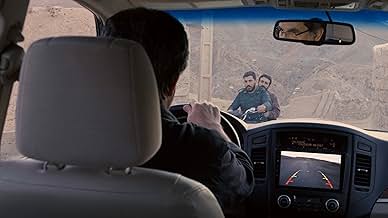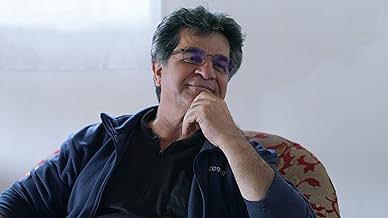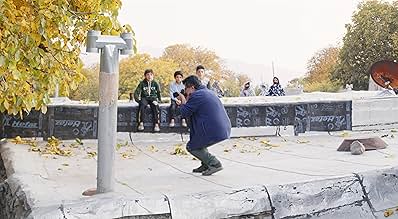IMDb RATING
7.2/10
4.7K
YOUR RATING
Two parallel love stories in which the partners are thwarted by hidden, inevitable obstacles, the force of superstition, and the mechanics of power.Two parallel love stories in which the partners are thwarted by hidden, inevitable obstacles, the force of superstition, and the mechanics of power.Two parallel love stories in which the partners are thwarted by hidden, inevitable obstacles, the force of superstition, and the mechanics of power.
- Awards
- 4 wins & 8 nominations total
Bakhtiyar Panjeei
- Bakhtiar
- (as Bakhtiar Panjei)
Narges Delaram
- Ghanbar's mother (Madar_e Ghanbar)
- (as Narjes Delaram)
Reza Heidari
- Reza
- (as Reza Heydari)
Aliye Tuzun
- Police
- (as Aliye Tüzün)
- Director
- Writer
- All cast & crew
- Production, box office & more at IMDbPro
Featured reviews
A most excellent movie ! Thoroughly enjoyed it. For sure there were many layers and implicit meanings I missed but that is also what made this film so intriguing. The contrast between the mountain town in Iran and the city in Turkey, all the details, the character extras that clearly showed the cultural differences, I loved that. The border, the trafficking that was implied, the faithfulness to truth of the central actor who is also the director. It's also a movie that celebrates movie making, how storytelling prevails in film, the impact of a story upon the storyteller. It´s a very poignant movie.
Wonderful footage in a documentary style, great story, amazing insight into life on the frontier.
Well worth seeing.
Wonderful footage in a documentary style, great story, amazing insight into life on the frontier.
Well worth seeing.
Film director Jafar Panahi is prohibited from leaving Iran, but is trying to make a film in neighbouring Turkey. In order to make that work, he moves to a remote village near the border, where the communications are a bit hit and miss. With the help of his obliging host "Ghanbar" (Vahid Mobaseri), though, he tries to make the best of it. Initially, it's a friendly village but when he takes (or doesn't!) a photograph of a young couple, he finds himself drawn into an increasingly acrid stand-off between two young men, and their families, to whom a girl may have been betrothed when her umbilical cord was cut. His frustrations with these encroachments are not helped by production difficulties with the two two stars of his documentary-style film - real life lovers who are trying to find a way to escape, safely, to Paris. There is the slightest hint of menace here as the plot develops and although we see little actual evidence, there is a distinct sense that this man is increasingly unwelcome, despite the platitudes from the villagers, encouraging a sixth-sense feeling that the authorities are distantly watching this film-maker. There is a distinct perception of intimidation! What is also clear is that these ordinary Iranian people live in fear of the police, the Revolutionary guard and that rather flies in the face of their genuine, peaceable and hospitable, nature. Now, perhaps Panahi's less-is-more style works for some, but for me I found this all rather a slow watch. He shuffles around with little useful dialogue to develop his on-screen persona, nor my interest in him. Clearly this is a story about freedom and a sort of subliminal oppression but somehow the characters themselves here didn't really develop that theme sufficiently, nor did they really engage me. The ending, too, is disappointing and inconclusive in equal measure and I was rather underwhelmed. The film does offer us an interesting depiction of rural life that probably hasn't changed in millennia, but somehow I felt little better than a fly on the wall with nowhere near enough to go on to join in. Perhaps just too much of this is predicated on a knowledge by the audience of this director and of his relationship with his government.
In 'No Bears', Jafar Panahi plays a clever game with his viewers. We see a film about the making of a film. But is this film within the film really a film, or is it reality being filmed? It sounds terribly complicated, but it isn't.
Basically, 'No Bears' consists of two parallel stories, with Jafar Panahi, who plays himself, as connecting element. Panahi, who is not allowed to leave Iran, has rented a room in a tiny village close to the Turkish border. From there, he supervises the making of a film on the other side of the border. He tries to make internet connection with his crew, but the technology fails. No worries: his assistent can cross the border freely with a hard drive containing the rushes.
By coincidence, Panahi gets involved in a bitter conflict between two family clans in the village. This is the first story. It starts relatively calm with the request to erase a photo Panahi has made. The villagers are at first visibly embarassed to disturb their distinguished guest from Teheran. It is nice to see the contrast between the villagers, who live according to ancient traditions, and the sophisticated Panahi with his MacBook and modern cameras. The conflict gets more and more serious, and ends in a tragedy.
The controversial photo itself is never shown. Here, Panahi plays again with reality. The event he has photographed may or may not have happened. He never admits having taken the photo. What the villagers want, is the evidence of its existence, or non-existence. But how can you prove something doesn't exist?
The second story is the film Panahi is making, set in Turkey. It is about an Iranian couple trying to flee to Europe. But soon it appears that the movie doesn't follow a written script. The couple are not actors, but real life refugees, and the camera follows their attempts to get out of the country. Sometimes, the crew adresses Panahi directly through the camera. It seems the fourth wall is being broken, but at the same time it isn't because we are looking at the film within the film.
Both stories are about a couple in love, and both have unhappy endings. In one very unsettling scene, Panahi is accused by one of his 'actors' to adapt reality, in order to film a happy ending. This, of course, is exactly what film making is about. Panahi's decision to film not one, but two unhappy endings is probably inspired by the unhappy situation he himself and his country are in. Panahi has been harassed for years by the Iranian regime. He has recently been released from prison, after starting a hunger strike.
In spite of this, 'No Bears' is not a sombre movie. The events in the village are in a way very amusing and even funny. Panahi himself never loses his cool and confronts the villagers in his own way: with a camera.
Basically, 'No Bears' consists of two parallel stories, with Jafar Panahi, who plays himself, as connecting element. Panahi, who is not allowed to leave Iran, has rented a room in a tiny village close to the Turkish border. From there, he supervises the making of a film on the other side of the border. He tries to make internet connection with his crew, but the technology fails. No worries: his assistent can cross the border freely with a hard drive containing the rushes.
By coincidence, Panahi gets involved in a bitter conflict between two family clans in the village. This is the first story. It starts relatively calm with the request to erase a photo Panahi has made. The villagers are at first visibly embarassed to disturb their distinguished guest from Teheran. It is nice to see the contrast between the villagers, who live according to ancient traditions, and the sophisticated Panahi with his MacBook and modern cameras. The conflict gets more and more serious, and ends in a tragedy.
The controversial photo itself is never shown. Here, Panahi plays again with reality. The event he has photographed may or may not have happened. He never admits having taken the photo. What the villagers want, is the evidence of its existence, or non-existence. But how can you prove something doesn't exist?
The second story is the film Panahi is making, set in Turkey. It is about an Iranian couple trying to flee to Europe. But soon it appears that the movie doesn't follow a written script. The couple are not actors, but real life refugees, and the camera follows their attempts to get out of the country. Sometimes, the crew adresses Panahi directly through the camera. It seems the fourth wall is being broken, but at the same time it isn't because we are looking at the film within the film.
Both stories are about a couple in love, and both have unhappy endings. In one very unsettling scene, Panahi is accused by one of his 'actors' to adapt reality, in order to film a happy ending. This, of course, is exactly what film making is about. Panahi's decision to film not one, but two unhappy endings is probably inspired by the unhappy situation he himself and his country are in. Panahi has been harassed for years by the Iranian regime. He has recently been released from prison, after starting a hunger strike.
In spite of this, 'No Bears' is not a sombre movie. The events in the village are in a way very amusing and even funny. Panahi himself never loses his cool and confronts the villagers in his own way: with a camera.
The movie "No Bears" has a sensitive and dramatic plot against the backdrop of political, religious, tradition, and cultural repression in the current Iranian world. There are two love stories told in parallel by the excellent director Jafar Panahi, who himself suffers military repression for his political movies that challenge the dictatorial Iranian government. Jafar Panahi manages to capture and transmit all the tension that Iranians suffer under the eyes of the so-called Cultural Police. We sense the pressure in the air and nobody wants to compromise or get involved or close to citizens considered traitors to the country and to the traditional customs.
Like many other incredible Iranian movies, "No Bears" is second to none in terms of quality. Simple in showing the daily life of a village and the background of filming a movie, but also bold in showing us what it's like to live in a repressive regime and not bend.
Like many other incredible Iranian movies, "No Bears" is second to none in terms of quality. Simple in showing the daily life of a village and the background of filming a movie, but also bold in showing us what it's like to live in a repressive regime and not bend.
The way Jafar Panahi successfully transcends and exceeds all the limits in his filmmaking always leaves me mind-boggled and is fascinatingly masterful. This viewing experience left me with a question "To what extent are you willing to go to tell your story?"
No Bears takes us through a powerful journey of sophisticated simplicity that expands boundaries and defies censorship restrictions both mentally and physically and in a blend of fiction and realism with a story of adaptive determination in creating, fear of crucial decisions, and passion for the story.
His ability to shape the narrative with all these elements is beyond impressive as Panahi sheds his lens on a parallel story between reality and fiction under the premise of hope, while metaphorically introducing a bigger political theme of the fear of modern authority versus the absurdity of the superstition that remains a common element in both narratives including the self-reflexively portrayal of himself as a character, which also introduces an intimate layer.
The storytelling crafts beautifully palpable emotions some of which are felt indirectly, where the sense of fear and threat are always visible and kept translating different feelings so well through an observative lens.
No Bears takes us through a powerful journey of sophisticated simplicity that expands boundaries and defies censorship restrictions both mentally and physically and in a blend of fiction and realism with a story of adaptive determination in creating, fear of crucial decisions, and passion for the story.
His ability to shape the narrative with all these elements is beyond impressive as Panahi sheds his lens on a parallel story between reality and fiction under the premise of hope, while metaphorically introducing a bigger political theme of the fear of modern authority versus the absurdity of the superstition that remains a common element in both narratives including the self-reflexively portrayal of himself as a character, which also introduces an intimate layer.
The storytelling crafts beautifully palpable emotions some of which are felt indirectly, where the sense of fear and threat are always visible and kept translating different feelings so well through an observative lens.
Did you know
- TriviaActually, the entire scene shot in Istanbul Kadikoy, not in Turkish border town.
- How long is No Bears?Powered by Alexa
Details
- Release date
- Country of origin
- Languages
- Also known as
- Khers nist
- Filming locations
- Iran(location)
- Production company
- See more company credits at IMDbPro
Box office
- Gross US & Canada
- $167,333
- Opening weekend US & Canada
- $6,173
- Dec 25, 2022
- Gross worldwide
- $1,196,288
- Runtime
- 1h 46m(106 min)
- Color
- Aspect ratio
- 1.85 : 1
Contribute to this page
Suggest an edit or add missing content























